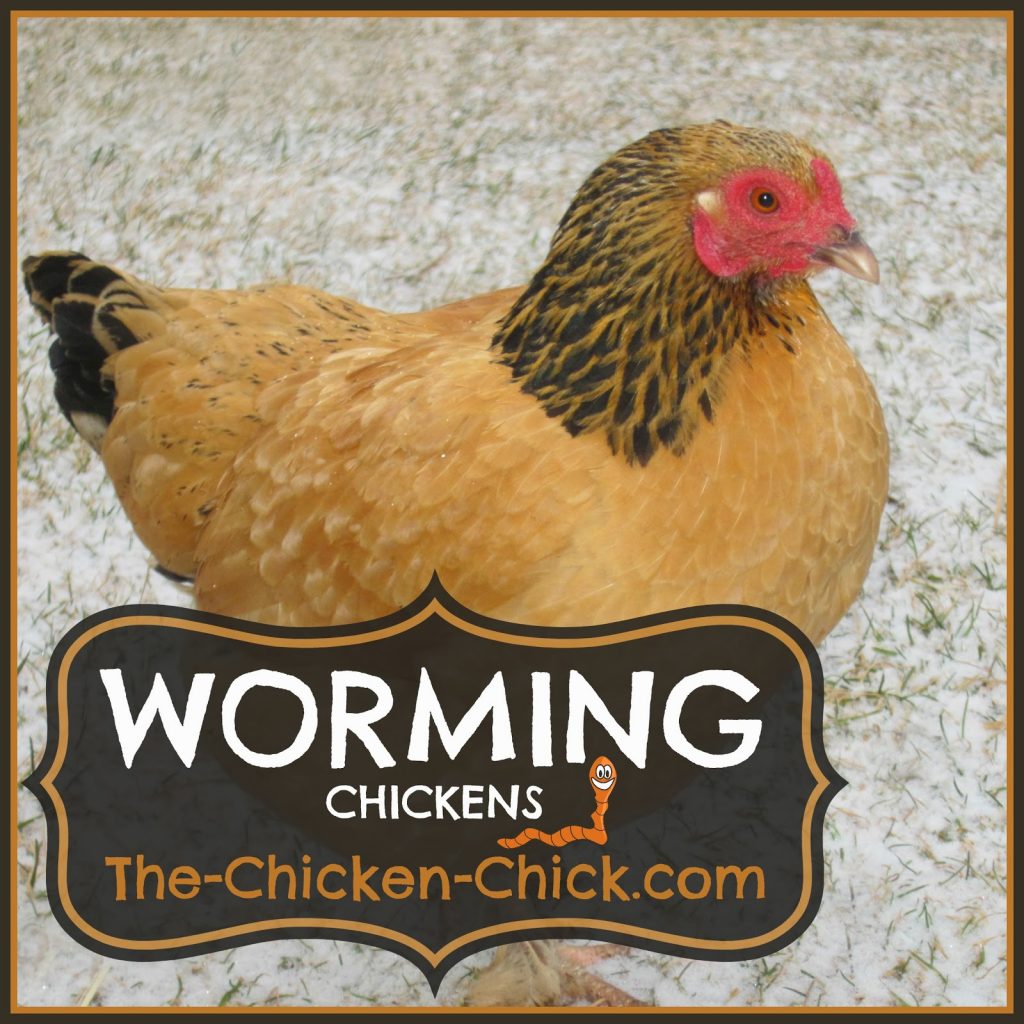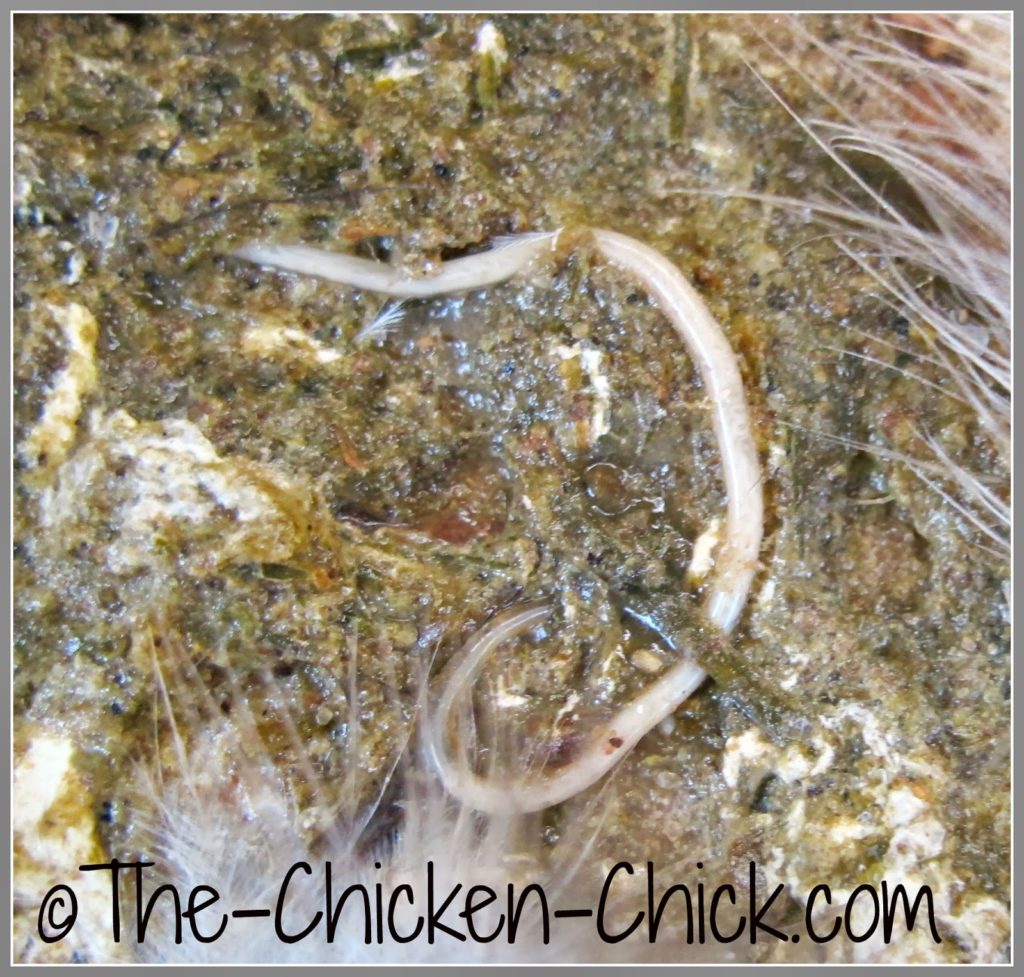Today’s question in my series “Answers from The Chicken Vet” comes from Linda M.:
Q: Do you need to worm preventative or only with symptoms?
A: Great question Linda! It’s a little more complicated than it appears at first blush, however. The obvious follow-up would be “what preventative drugs would you use?” This is even more complicated.
There are several types of worms that cause infections (helminthiases in vet-speak). There are tape-worms, roundworms, threadworms and flatworms. If you are interested in weird life-cycles, they are a LOT of fun. For example, the tapeworm Prosthogonimus macrorchis has to have its egg eaten by a water snail, where they reproduce asexually creating “cercariae”. The cercariae then infect immature dragonflys. The dragonflys metamorphose into adults, which makes the cercariae capable of infecting hens. A chicken then eats the adult dragonfly, completing the cycle. This little story should tell you 2 things….1 – be amazed how nature makes things work, and 2 – thank your lucky stars you did not have to sit through this stuff in vet school!
Now, the practical aspects of worms and chickens. There are actually few worms that cause true disease in hens. There is gapeworm, which can cause respiratory distress, and some intestinal nematodes can cause some slowed growth, and threadworms can cause some production drops in commercial birds. All these infections assumedly cause some discomfort while the immature worms migrate through the body. But, there is not that much pathology that results from worm infections. There is an “ick” factor though. Many people don’t like the idea of creepy-crawlies inside their birds. Plus, it is uncommon, but occasionally, birds that have a worm infection can produce an egg with a roundworm in it. Some people find this off putting. The other thing is that the hens will often carry quite a load of worms before showing any signs. This bothers some owners as well.
To control worms, the best strategy is to control the worms twice per year. Once when you bring the hens off range in the fall, and once when you go to put the hens back on range in the spring. The idea is that there will be an increase in worm load in the tighter quarters of the coop over winter. If you decrease the parasite load before you bring the birds in, the amount of worm eggs in the coop will grow slowly. Then when you move them back out on range, where the worms can continue with their life cycle, knock them back again, to slow the increase in numbers.
What product should you use to control worms? Here is an issue that gets some people’s dander up. Most worm medications have no claim for laying hens. As such, they won’t tell you how long not to eat the eggs after treatment, like many antibiotics do. The reason is simple….the research has not been done. It literally costs millions of dollars to get label claims on medications verified to the satisfaction of licensing bodies. Because modern egg farms have essentially no worm infections, it is not cost effective to get the claim on the drug in question. Poultry medication is a victim of its own success. The reality is that most of the products are safe, and most don’t even get into the egg….they are medications that affect the gut, and seldom are absorbed into the bloodstream. The problem is that there is no proof of their safety. Piperazine, (Wazine) levamisole, fenbendazole (Safe-guard) and hygromycin are all effective anthelminthics (anti-worm drugs….NEVER play scrabble against a vet!), and to keep resistance from developing in the worms in your chickens, you should rotate 2 or 3 of them in a program. Use product A in the fall, Product B in the spring, Product C in the following spring….etc.
I hope this answers your questions,
Dr. Mike Petrik, DVM, MSc
The Chicken Vet
Kathy Shea Mormino
Affectionately known internationally as The Chicken Chick®, Kathy Shea Mormino shares a fun-loving, informative style to raising backyard chickens. …Read on


shop my SPONSORS
Today’s question in my series “Answers from The Chicken Vet” comes from Linda M.:
Q: Do you need to worm preventative or only with symptoms?
A: Great question Linda! It’s a little more complicated than it appears at first blush, however. The obvious follow-up would be “what preventative drugs would you use?” This is even more complicated.
There are several types of worms that cause infections (helminthiases in vet-speak). There are tape-worms, roundworms, threadworms and flatworms. If you are interested in weird life-cycles, they are a LOT of fun. For example, the tapeworm Prosthogonimus macrorchis has to have its egg eaten by a water snail, where they reproduce asexually creating “cercariae”. The cercariae then infect immature dragonflys. The dragonflys metamorphose into adults, which makes the cercariae capable of infecting hens. A chicken then eats the adult dragonfly, completing the cycle. This little story should tell you 2 things….1 – be amazed how nature makes things work, and 2 – thank your lucky stars you did not have to sit through this stuff in vet school!
Now, the practical aspects of worms and chickens. There are actually few worms that cause true disease in hens. There is gapeworm, which can cause respiratory distress, and some intestinal nematodes can cause some slowed growth, and threadworms can cause some production drops in commercial birds. All these infections assumedly cause some discomfort while the immature worms migrate through the body. But, there is not that much pathology that results from worm infections. There is an “ick” factor though. Many people don’t like the idea of creepy-crawlies inside their birds. Plus, it is uncommon, but occasionally, birds that have a worm infection can produce an egg with a roundworm in it. Some people find this off putting. The other thing is that the hens will often carry quite a load of worms before showing any signs. This bothers some owners as well.
To control worms, the best strategy is to control the worms twice per year. Once when you bring the hens off range in the fall, and once when you go to put the hens back on range in the spring. The idea is that there will be an increase in worm load in the tighter quarters of the coop over winter. If you decrease the parasite load before you bring the birds in, the amount of worm eggs in the coop will grow slowly. Then when you move them back out on range, where the worms can continue with their life cycle, knock them back again, to slow the increase in numbers.
What product should you use to control worms? Here is an issue that gets some people’s dander up. Most worm medications have no claim for laying hens. As such, they won’t tell you how long not to eat the eggs after treatment, like many antibiotics do. The reason is simple….the research has not been done. It literally costs millions of dollars to get label claims on medications verified to the satisfaction of licensing bodies. Because modern egg farms have essentially no worm infections, it is not cost effective to get the claim on the drug in question. Poultry medication is a victim of its own success. The reality is that most of the products are safe, and most don’t even get into the egg….they are medications that affect the gut, and seldom are absorbed into the bloodstream. The problem is that there is no proof of their safety. Piperazine, (Wazine) levamisole, fenbendazole (Safe-guard) and hygromycin are all effective anthelminthics (anti-worm drugs….NEVER play scrabble against a vet!), and to keep resistance from developing in the worms in your chickens, you should rotate 2 or 3 of them in a program. Use product A in the fall, Product B in the spring, Product C in the following spring….etc.
I hope this answers your questions,
Dr. Mike Petrik, DVM, MSc
The Chicken Vet




























Safeguard paste for horses? From the convenient tack shop 2 miles from my house? That would be FANTASTIC! I think they may carry the goat one. My question is how much paste/per chicken… 6-8 lb chicken?
They were due next month but I just wormed my girls with Safeguard last week because I found several dead roundworms while doing my daily coop poop-scoop. I live in Florida where, unfortunately, no insects die off due to cold so I've had them on a twice a year worming regimen. Since my chickens free range during the day all year round and since there are cows, horses, sheep and dogs here I think worms are inevitable.
Please call and speak with a veterinarian at the USDA. The call and the conversation are free. 866-536-7593
Kathy – I am hoping you can answer this question. I recently lost several birds due to basic body wasting. In one hen, before she died, she had feces like the picture shown above (that looks like spaghetti). I called my vet friend, who does not treat chickens, and she researched a wormer for me. It didn't work and the bird passed away and then several other birds followed. We asked our Poultry 4-H club director and he said to get a general dewormer, which we did. I gave them the medicine last week and now all my birds are… Read more »
Hi. I was actually looking for information on worming. Very helpful! I see no signs of worms yet but with the new miniature donkeys, we have to worm them regularly and we are supposed to swap back and forth between the medications used, so I think I will add the ladies to the farm schedule for worming. When we have a pig or two, they need to be wormed regularly too. Thank you for this article!